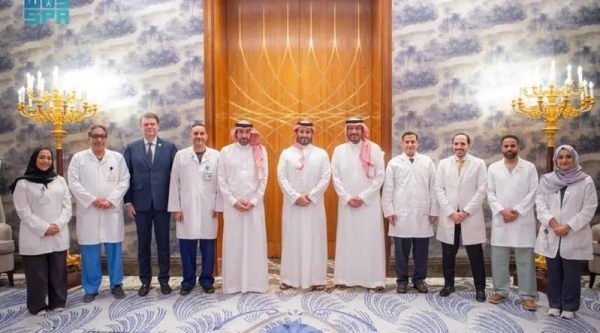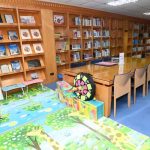Saudi Crown Prince and Prime Minister Mohammed bin Salman recently received the Saudi medical team at his office in Riyadh after they successfully performed the world’s first fully robotic heart transplant. The groundbreaking procedure, which took place at King Faisal Specialist Hospital & Research Centre (KFSHRC) in Riyadh, was carried out on a 16-year-old patient suffering from end-stage heart failure in September 2024. Led by Dr. Feras Khaliel, a renowned Saudi cardiac surgeon, the two-and-a-half-hour surgery marked a significant milestone in the field of cardiac surgery and robotics. The Crown Prince commended the team for their achievement, highlighting their exceptional skills and innovative approach.
The meeting with the Crown Prince also included Mazen Al-Rumaih, Chairman of the Board of Directors of KFSHRC, Dr. Majed Al-Fayyadh, CEO of KFSHRC, and Dr. Björn Zoega, Deputy CEO. During the reception, the Crown Prince extended his congratulations to the medical team and KFSHRC leadership, recognizing the historic significance of the world’s first robotic heart transplant. He lauded the team’s competencies and their ability to push the boundaries of medical innovation, emphasizing the positive impact on human health in the Kingdom and beyond. The medical team expressed their pride and gratitude for the opportunity to meet the Crown Prince, acknowledging his unwavering support as a driving force behind their success.
Dr. Feras Khaliel, the head of the medical team, emphasized the importance of the Crown Prince’s recognition as an incentive to further their efforts in serving humanity and the nation. The team’s dedication to advancing medical technology and improving patient outcomes was evident in their successful execution of the robotic heart transplant. The innovative approach taken by the Saudi medical team has set a new standard in the field of cardiac surgery, showcasing their commitment to excellence and willingness to embrace cutting-edge technologies for the benefit of patients. The Crown Prince’s endorsement of their achievements serves as motivation to continue pushing the boundaries of medical science.
The successful robotic heart transplant not only demonstrates the capabilities of the Saudi medical team but also highlights the Kingdom’s commitment to promoting innovation and excellence in healthcare. By leveraging advanced technologies such as robotics, the team at KFSHRC has positioned itself as a global leader in cardiac surgery, attracting international attention and admiration for their groundbreaking work. The recognition from the Crown Prince further solidifies the team’s reputation as pioneers in the field, encouraging them to pursue further advancements in medical science for the betterment of society.
The collaboration between the Saudi medical team and KFSHRC leadership has been instrumental in achieving the world’s first robotic heart transplant, showcasing the importance of teamwork and shared goals in driving innovation. The commitment to excellence and patient care demonstrated by Dr. Feras Khaliel and his team has not only raised the bar for cardiac surgery but has also inspired others to explore new possibilities in the field. The support and encouragement from the Crown Prince have played a vital role in empowering the team to reach new heights and make significant contributions to the advancement of healthcare in the Kingdom and beyond.
In conclusion, the world’s first fully robotic heart transplant performed by the Saudi medical team at KFSHRC represents a major milestone in the field of cardiac surgery and robotics. With the support of the Crown Prince and the leadership of KFSHRC, the team has demonstrated their unwavering commitment to excellence and innovation, setting a new standard for medical procedures. The successful outcome of the procedure not only highlights the team’s exceptional skills and dedication but also underscores the Kingdom’s dedication to advancing healthcare and promoting cutting-edge technologies in the medical field. As the Saudi medical team continues to push the boundaries of what is possible in cardiac surgery, the future looks bright for further advancements in medical science and patient care.





















